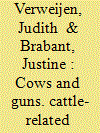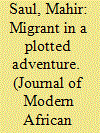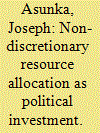|
|
|
Sort Order |
|
|
|
Items / Page
|
|
|
|
|
|
|
| Srl | Item |
| 1 |
ID:
151615


|
|
|
|
|
| Summary/Abstract |
This paper analyses the role of cattle in the entwined dynamics of conflict and violence in the Fizi and Itombwe region of South Kivu province, in the eastern Democratic Republic of the Congo. On the one hand, agropastoral conflict intensifies armed mobilisation, allowing armed groups to draw upon particular conflict narratives that generate popular and elite support. It also creates incentives for armed actors to engage in cattle-looting, or the defence against it, for both symbolic and material reasons. On the other hand, the presence of armed forces and the use of violence profoundly shape agropastoral conflicts. Importantly, they change the perceived stakes of these conflicts, and hamper their resolution. By showing that the relations between cattle-related conflict and armed activity are indirect, complex and mutual, the paper refines both theories on agropastoral conflict and those highlighting the role of local conflicts in fuelling violence in the eastern Congo.
|
|
|
|
|
|
|
|
|
|
|
|
|
|
|
|
| 2 |
ID:
151620


|
|
|
|
|
| Summary/Abstract |
Previous literature on women's representation in the Ugandan Parliament painted a grim picture of women exploited by political leaders, and brought into Parliament and other political spaces by a benevolent dictator who allowed their entry to extend and deepen his political networks. These women were expected to accept a subordinate and inferior place, and to defer to male authority. Female members cooperated dutifully by ‘knowing their place’ and by actively supporting the ‘hand that fed them’. Studies noted that women lacked gender consciousness and even the analytical power to understand the implications of the policies they helped pass. There was a general consensus that patriarchal attitudes in Parliament diminished women's influence and undermined their political efficacy. This paper analyses gender relations, and examines the status of female members through their words, actions and behaviours in the Ugandan Parliament. The three primary sources of data for this study were surveys, semi-structured interviews of male and female members of Parliament, and the proceedings of parliamentary debates in 2014. Analysis of parliamentary debates and personal accounts of gender relations in the 9th Parliament reveal a changing landscape. Women are moving from marginal roles to more central roles in Parliament, and are becoming active participants in shaping parliamentary discourse and policy outcomes. There is a newfound sense of empowerment among respondents. Women articulated a new sense of being respected in Parliament, a sense of self- and collective efficacy that they can advance policy priorities. There is a change in women's performance on the Chamber's floor. Parliamentary proceedings offer evidence of an ability to successfully engage in vigorous debates, effectively advance their policy agendas, and utilise sophisticated political strategising and manoeuvring. While there are still elements of continuity, a new gender schema is emerging – a schema that challenges traditional values and attempts to reconcile these values with requirements for running a modern government.
|
|
|
|
|
|
|
|
|
|
|
|
|
|
|
|
| 3 |
ID:
151623


|
|
|
|
|
| Summary/Abstract |
Despite policy commitments and legislated mechanisms, the system of participatory democracy in post-1994 South Africa is largely considered to have failed. In order to understand how underlying ideas can help to explain weaknesses in practice, this article examines how participatory democracy is understood by the ruling African National Congress (ANC). It shows that the multiple intellectual traditions shaping the participatory model have led to a set of policy initiatives that are not without internal tension. In part, the technocratic creep associated with improving public sector performance has stymied participatory efforts by placing efficiency and delivery over democracy and empowerment. Alongside this, however, the ANC's own conception of ‘democracy’ remains interwoven with its mass movement history – linking the role of popular participation to the extension of its own hegemony. The intent of policy to deepen democracy through structures of participatory governance is thus undermined by a teleological framing of participation as an intra-movement activity.
|
|
|
|
|
|
|
|
|
|
|
|
|
|
|
|
| 4 |
ID:
151624


|
|
|
|
|
| Summary/Abstract |
This article presents the cases of two migrant men, a Senegalese and a Nigerian, who spent many years in Istanbul. Although their backgrounds, personalities and circumstances were different, they both did export-related commercial work in the city. After describing sub-Saharan migration to Turkey and the literature concerning it, the text focuses on the stories these migrants spontaneously presented as they explained why they had become migrants. It was striking that with very different personal details, events and coincidences, both stories attribute the decision to migrate to Istanbul to a traumatic accident that forced the protagonists to change a life that until that point did not involve transnational migration. In the stories the protagonist's ambition, determination and will are rendered invisible and he is presented as a victim. I call this rhetorical topos ‘great mishap’. It resonates with stories I have heard from other migrants. I interpret it as an expression of compunction, of social responsibility weighing on the actor for abandoning close others in favour of an individual quest for self-realisation.
|
|
|
|
|
|
|
|
|
|
|
|
|
|
|
|
| 5 |
ID:
151619


|
|
|
|
|
| Summary/Abstract |
When would politicians reduce or eliminate their own discretion in the distribution of valued benefits to voters? I argue that the answer lies in the extent of partisan attachments among voters: politicians would be more likely to adopt non-discretionary or self-binding resource allocation rules in contexts where voters evince weak attachment to political parties. Non-discretionary distributive rules allow politicians to reach unattached voters with benefits without angering their loyal supporters who might otherwise expect to be favoured. They also signal politicians’ commitment to unbiased distribution of public resources, which, research shows, attracts unattached voters. Analysis of data on allocations of legislators’ development funds in Ghana provides strong support for this argument. This result is robust to controls for alternative explanations and thus advances understanding of when politicians in new democracies would pursue reforms designed to reduce or eliminate political discretion.
|
|
|
|
|
|
|
|
|
|
|
|
|
|
|
|
| 6 |
ID:
151621


|
|
|
|
|
| Summary/Abstract |
This article presents a spatial approach to the recent history of conflict and confrontation between the Ethiopian Government and Ethiopian Muslim Communities in Addis Ababa. Based on original ethnographic data and inspired by existing academic studies on political-religious relationships in Addis Ababa, this study takes a closer look at the significance of the urban public landscape in power-struggles between the EPRDF and the Muslim communities. The article argues that political-religious struggle in Addis Ababa shapes the current urban landscape, as use of and control over urban public space and place forms a crucial element in the strategies of public authority of all involved actors.
|
|
|
|
|
|
|
|
|
|
|
|
|
|
|
|
|
|
|
|
|